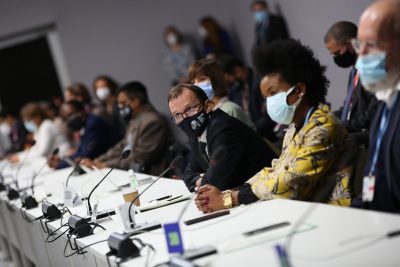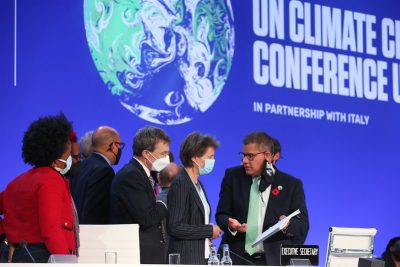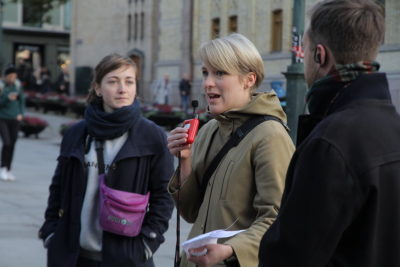NEWS ANALYSIS: Norway supports the dramatic outcome of the UN Climate Change Conference in Glasgow, with Norwegian officials insisting it’s “major step in the right direction” and environmentalists calling it “better than nothing.” Perhaps that’s all that could be expected in an oil-producing nation with a government that, even in the midst of the Glasgow meeting, presented a new state budget proposal that will allow Norway’s emissions to rise, not fall, over the next year.

As an entire world hashed out ways of trying to slash emissions and limit climate change, Norway’s new minority Labour-Center government set itself up for tough negotiations of its own. Its newly proposed budget has been attacked from all sides in Parliament, most notably by parties farther to the left and from which the government needs majority support. They’re highly critical to the budget proposal: Not only does the government refuse to rein in Norway’s oil and gas industry, it also proposes relief from rising fuel taxes for those who still rely on fossil-fueled vehicles. The fight is due to escalate this week, when Norway’s Socialist Left Party (SV) will promote its own budget proposals to challenge the new government’s, which in turn revised the former Conservative government’s budget presentation.
The budget put forth by the Labour- and Center Parties has also been blasted, even mocked, by lots of political commentators. Lars West Johnsen, for example, wrote in newspaper Dagsavisen last week that he couldn’t help but wonder what the foreign minister of Tuvalu (among South Pacific nations threatened by rising seas that already have complained about Norway’s oil) would think about a government that not only backs its emission-generating oil industry but also will once again allow emissions from the civilian population to rise, in order to protect its middle class.
“I’m quite certain he’d be quite sour,” Johnsen wrote. “He would not be especially impressed that one of the world’s largest exporters of oil and gas, among the wealthiest and biggest champions of the green shift, doesn’t manage to cut its own emissions.”
Tempers also ran high when climate talks concluded during the weekend in Glasgow, where Norwegian Climate and Environment Minister Espen Barth Eide of the Labour Party helped lead negotiations to strengthen rules around climate quotas. He claims those negotiations were successful and now guard against quotas being counted twice by both those buying and selling them.
If Norway buys a quota from Brazil, for example, Norway will be able to register the cut in its climate account, not Brazil. That’s at least part of how Norway has paid its way out of making actual cuts at home for years. Eide rejected complaints from Norway’s chapter of Friends of the Earth (Naturvernforbund), which dismissed the new quota trading rules as more “greenwashing.”

Eide, one of the Norwegian government’s top representatives in Glasgow, also claimed the UN summit “has taken us a major step in the right direction. The nations of the world agree that we must strengthen efforts to reach a global warming goal of (just) 1.5 degrees.”
Norway’s climate minister admitted to Norwegian Broadcasting (NRK), though, that the “climate ambitions” expressed in Glasgow “still aren’t enough to meet the 1.5 degree goal, but we are closer, and the world has received clear instructions that we must continue to increase our climate ambitions. Now all the countries have to follow up their commitments and turn words into action.” Countries not reporting goals that would help meet the 1.5-to-2 degree goal must also deliver new goals by the end of next year.
The UN summit ended, meanwhile, on a dramatic note after India and some other countries including Venezuela and Iran spoiled things at the last minute. India objected to wording in the text of what was supposed to be the final agreement, and after delegates from India, China and the US reportedly left the room and later returned, new wording was suddenly pushed through: Instead of phasing “out” the use of coal, the world will instead phase it “down.”
That’s believed to have considerably weakened the initial agreement, and it upset not only the summit’s leader Alok Sharma but also the EU and many countries from Mexico to Fiji, Switzerland and Norway’s partner in the European Economic Area, Liechtenstein. Sharma choked up while announcing from the podium in Glasgow that he was “so sad about how this has unfolded, and I’m deeply sorry. I also understand the deep disappointment, but I think as you have noticed, it’s also vital that we protect this package.”
Norway’s Eide told NRK he didn’t think Sharma needed to apologize, claiming Sharma did “a great job” leading the summit: “I understand he did that (apologize) on behalf of the institution, because some countries feel the last clarification occurred between some of the big countries (like India, China and the US) and they weren’t included. That had to happen.”

Not everyone agrees, with Frederic Hauge of the environmental organization Bellona telling NRK that his pulse “went up at bit” when India previled with its alternative text and highly controversial formulering. Others claimed it was done with none of the transparency expected at a UN climate summit. “I was shaken after what came from India and China, that’s not usual,” Hauge said, “but as the leader of the negotiations said, it’s still an historic agreement. It’s much better than no agreement.” Hauge also thinks it strengthens the Paris agreement.
Eide agreed it was “the most dramatic point, and several countries including India but also Iran, Venezuela and others tried to remove every reference to both coal and fossil subsidies. They didn’t succeed.” Eide conceded the final agreement was “not as strong and I would have wanted it, but still much stronger than anything we’ve had earlier.” He’s satisfied with the outcome of the summit.
Norway also has a long history of being a “good ally” of the US and reluctant to challenge China, so it would have been just as unusual for Norway to forcefully object to the objections, especially as an oil-producing country with its own fossil industry it’s keen to protect. Wealthy countries like Norway will also need to double their contributions to climate financing for poor countries by 2025 and hold their own meetings every other year.
Back into the lions’ den in Norway
Now Eide will need to defend both the UN agreement and his own government’s budget. It’s believed to allow an emissions increase from the transport sector that’s even as much as 2 million tons higher than the former Conservatives-led government’s budget proposal.
Johnsen of Dagsavisen noted how Eide had, just a few weeks ago, promised the budget would be “greener” and yield bigger emissions cuts that the former government’s proposed budget for 2022. Instead, Eide ended up conceding that emissions will instead rise but only, he told newspaper Dagens Næringsliv (DN), because the new Labour-Center government was being “more honest.”
Ready to pounce is the Socialist Left Party (SV), which already had roundly criticized the Labour-Center government platform as far too weak on climate issues. SV is now calling the government’s budget “narrow and weak” as well, also on measures aimed at reducing social differences.

Both SV, the Greens and the Reds want to keep fuel taxes high along with many more, start curtailing oil production and halt more oil exploration, especially in the Arctic, as does the Liberal Party. The Greens called the government’s budget “a lost opportunity.” Other critics claim it defies the Glasgow summit. SV’s chief budget negotiator and Member of Parliament Kari Elisabeth Kaski has already told Dagsavisen that SV wants to be “constructive” but that Eide, Finance Minister Trygve Slagsvold Vedum of the Center Party (who demonstratively drives around Oslo in a gas-guzzling pick-up truck) and Labour Prime Minister Jonas Gahr Støre “will meet our demands because they must.”
Other critics have reacted to the budget present by Vedum, and Norway’s climate policy in general, with sarcasm, confusion and more charges that Norway operates with double standards. The quest for an alternative to oil and a green restructuring has been talked about for years without happening. Norway’s own emissions have kept rising, in addition to those generated by the oil Norway exports.
More hypocrisy
The Liberals’ former climate and environment minister Sveinung Rotevatn also thinks the government’s budget is weak on climate issues, just like the pro-farming Center Party in general. “Eide (of Labour) can’t stand in Glasgow and talk about a green shift and that the world must do more, at the same time (Center’s finance minister) Vedum stands at the Parliament’s podium and does the opposite,” Rotevatn told news bureau NTB kast week. He thinks the new government’s first budget “bodes very badly for climate measures over the next four years.”
The Greens Party, meanwhile has noted that the budget is also weak on funding to halt deforestation at home and preserve more nature. There was also concern last week when newspaper Klassekampen reported that the leader of Norway’s largest trade union confederation LO, Peggy Hessen Følsvik, wants the government to set up a commission that would be charged with ensuring that the much-hyped green shift be made in the “most fair” manner to preserve jobs. She doesn’t want the environmental movement to be part of it. LO is the biggest backer of the Labour Party.
Labour’s Prime Minister Støre, accused of “more blah blah” in his own speech in Glasgow, himself admitted to NTB that his government hadn’t calculated exact emissions tied to his proposed budget. He nonetheless defended it. He stressed, for example, how it maintains a major increase (28 percent) in carbon taxes and provides funding for new green industrial ventures and investments. The battle over the budget will be his first major test, as he struggles for a majority in Parliament. Negotiations are expected to be rough and that they’ll dominate the entire fall session. A budget must be in place well before the Christmas holiday recess, which is only around a month away.
newsinenglish.no/Nina Berglund

